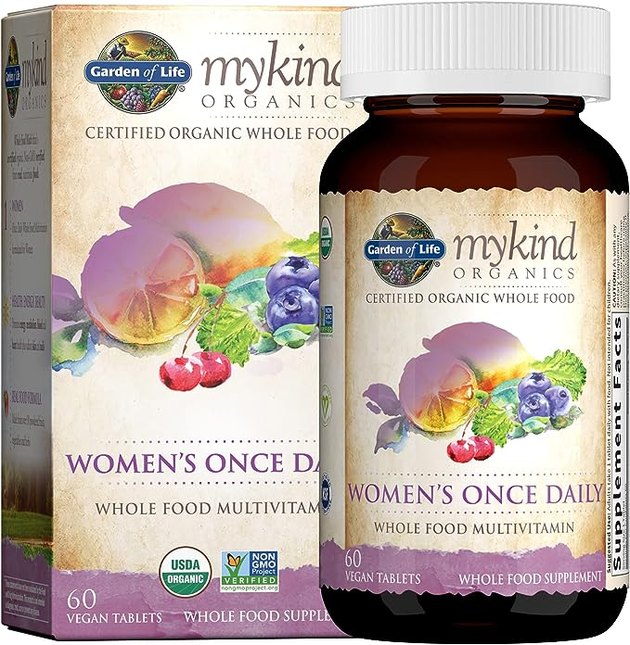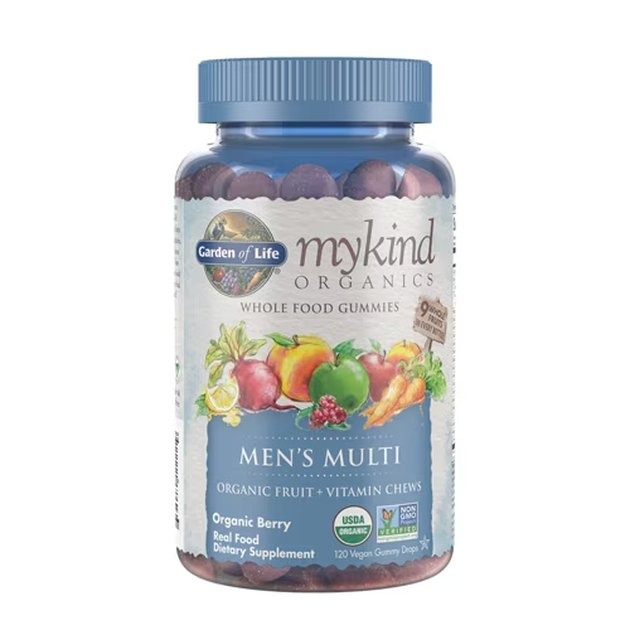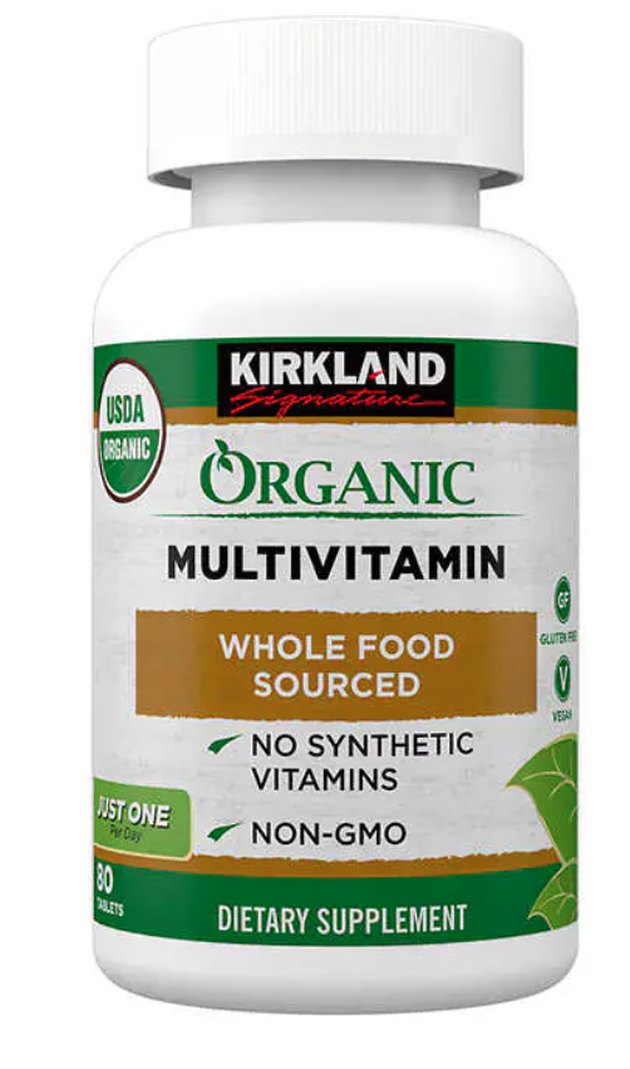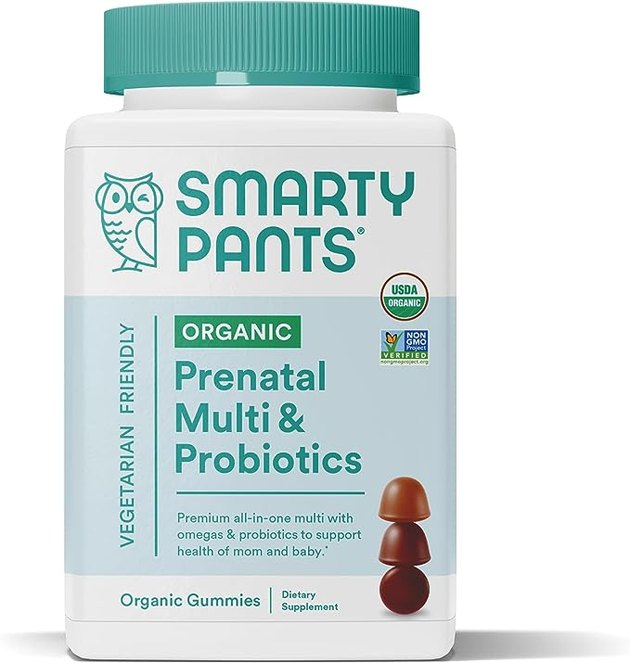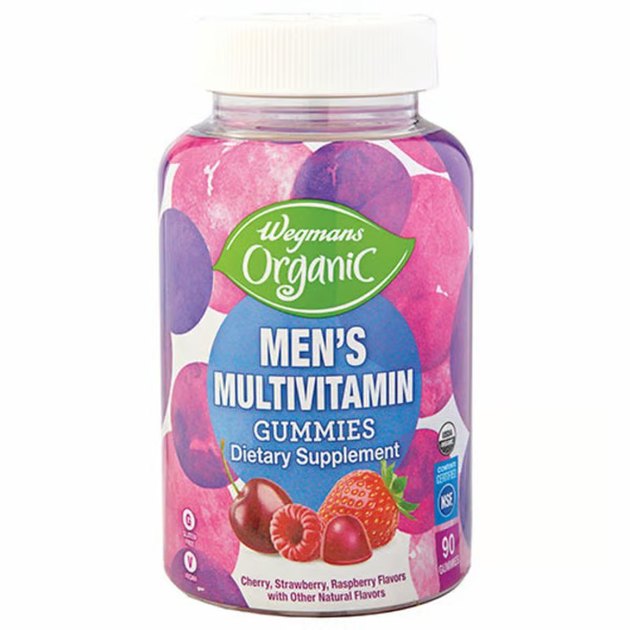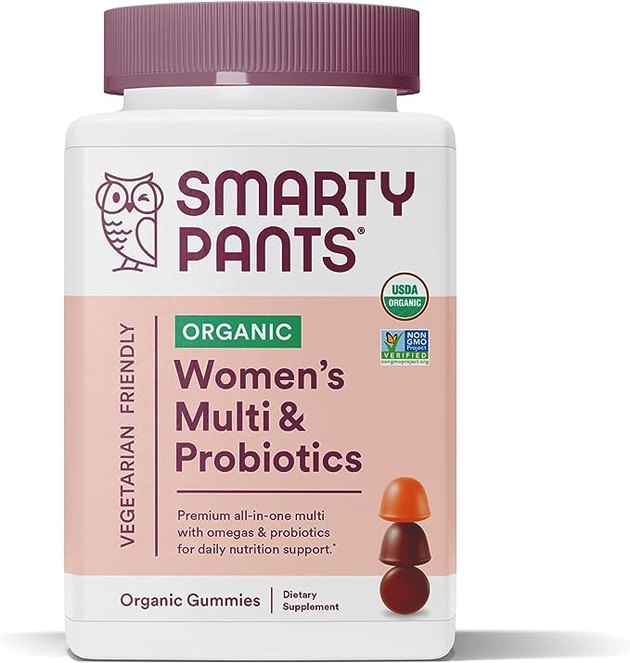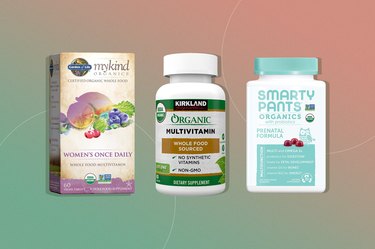
If you opt for organic foods on your plate, it follows that you should seek out organic supplements, too.
An organic multi is derived from real food, says Lisa Moskovitz, RD, CDN and CEO of NY Nutrition Group. On the flip side, non-organic multis are usually created from ingredients made in a lab. While this sounds somewhat off-putting, research shows that both options are equally effective, Moskovitz says.
Video of the Day
Video of the Day
The best organic vitamins for you depend on your individual nutrient needs. Before taking any supplement, including a multi, it's best practice to get your nutrient levels checked by getting a blood test done. If you're not deficient in any specific nutrient, your doctor will likely recommend skipping a multivitamin.
All of the supplements below are USDA Certified Organic.
Our Picks
- Best Organic Multivitamin for Women: Garden of Life MyKind Organics Multivitamin for Women ($33.29, Amazon)
- Best Organic Multivitamin for Men: Garden of Life MyKind Organics Multivitamin for Men ($31.95, Amazon)
- Best Budget-Friendly Organic Multivitamin: Kirkland Signature USDA Organic Multivitamin ($22.99, Costco)
- Best Organic Prenatal Multivitamin: SmartyPants Organic Prenatal Vitamins ($21, Amazon)
- Best Easy-to-Take Organic Multivitamin for Men: Wegmans Organic Men's Multivitamin Gummies ($9.99, Wegmans)
- Best Easy-to-Take Organic Multivitamin for Women: SmartyPants Organic Women's Multivitamin ($33.57, Amazon)
How We Chose
Supplement marketing often makes bold claims. That's possible because, unlike prescription medications, the FDA doesn't regulate supplement safety and efficacy. They do, however, establish Current Good Manufacturing Practices (CGMPs) for supplements, including requirements for preparation and storage.
All of the certified-organic supplements below come recommended by registered dietitians, adhere to CGMP or have verification from independent quality control organizations such as:
Find out more about how we cover products.
A Note on Language
It's very typical for supplement makers to have options geared toward either women or men. Sometimes this is due to differing nutritional needs of people assigned female at birth (AFAB), such as during pregnancy. Other times, this is based on assumptions based on factors like body size and physical activity. In this article, we'll use the terms "women" and "men" to match the brands' language, but you should talk to your doctor about the vitamins and supplements that best suit your needs.
1. Best Organic Multivitamin for Women: Garden of Life MyKind Organics Women's Once Daily
"Garden of Life is a larger brand that I regularly recommend," says NYC-based dietitian Amy Shapiro, RD, CDN, founder of Real Nutrition. She particularly likes the MyKind Organics line, noting that it's widely available and "made from organic fruits, vegetables and herbs."
This multi has 15 vitamins and minerals, including vitamins A, C, D and E. It also includes B vitamins and iron.
2. Best Organic Multivitamin for Men: Garden of Life MyKind Organics Whole Food Men's Multi
The men's version of this multi is also organic. It includes essential vitamins and minerals to support men's health, including 111 percent of your daily value (DV) of vitamin C, and 100 percent of your DV of zinc, vitamin K and folate.
3. Best Budget-Friendly Organic Multivitamin: Kirkland Signature USDA Organic Multivitamin
This budget-friendly certified organic option from Costco's brand Kirkland contains 100 percent (or more) of your daily value of several essential vitamins and minerals, including vitamins A, C and D3, and folate, biotin and selenium.
Each daily tablet is vegan and the ingredients are sourced from whole foods.
4. Best Organic Prenatal Multivitamin: SmartyPants Organic Prenatal Vitamins
This prenatal multivitamin is USDA-certified organic.
All products are made in a GMP-compliant facility, per SmartyPants, which outlines its testing processes carefully on the website. (GMP, which stands for "good manufacturing practices" are regulations set out and overseen by the FDA, according to the International Society for Pharmaceutical Engineering.)
A daily dose is four gummies, which delivers 15 nutrients, including vitamin D, niacin and folate.
5. Best Easy-to-Take Organic Multivitamin for Men: Wegmans Organic Men's Multivitamin Gummies
Monster-sized pills can be a challenge to swallow. While it's important to watch the calorie count, gummies or other chewable options can be an alternative that'll encourage you to build up the habit of taking a multi. This gummy option from Wegmans is certified organic and NSF-certified.
A serving size is three gummies, which provides 100 percent of your DV of vitamins D, E, B6 and B12, as well as folate.
6. Best Easy-to-Take Organic Multivitamin for Women: SmartyPants Organic Women's Multivitamin
This chewable multi contains 15 nutrients. That includes vitamin D, which supports bone health, per the Mayo Clinic. It also contains 100 percent of your DV of biotin and vegetarian sources of fatty acids. This multi also contains probiotics, aka good-for-you gut bacteria that aid with digestion and immune health, according to Harvard Health Publishing.
One note to keep in mind: This vitamin is not NFP- or UPS-certified, but it is manufactured in a GMP facility.
Why Choose Organic?
Organic multivitamins are derived from organically grown whole foods, which means they may offer the same benefits as organic foods.
Organic foods are grown without pesticides, which are substances used in farming to kill or repel plants or animals considered pests. These pesticides may be harmful to health, and some evidence links them to harmful neurodevelopmental effects in children, according to the National Institutes of Health (NIH).
Conventionally grown foods are the primary source of exposure to pesticide residues in the general population, according to an October 2017 review in Environmental Health.
Organic foods are not genetically modified. Genetic engineering involves manipulating genes to create more desirable agricultural outcomes. Although this sounds good, it does not come without potential risks to human health, farmers, the environment, domesticated animals and wild animal populations, according to the Center for Food Safety.
Organic farming practices are more forward-thinking, taking into consideration the health of the soil and the environment for future generations. Healthy soil means more long-term food cultivation prospects — and it also means less environmental damage, which has more far-reaching effects than just a season's harvest.
"If you can afford [organic supplements], you are ensuring you are avoiding any pesticides or fillers that might be used in less expensive or non-organic varieties," Shapiro says. Plus, taking organic multivitamins means you're getting vitamins from whole-food sources.
What to Look for and Things to Consider
This is the tricky part. Here are some considerations to keep in mind as you seek out an organic supplement.
1. An Organic Seal
The first thing to look for is the organic seal. Products may come up with clever ways to make consumers think a supplement is organic, when it may just contain a few organic ingredients.
Organic certification by the USDA guarantees that a food or supplement is comprised of at least 95 percent organic ingredients. Some products may be labeled "100 percent organic," which means they do not contain any inorganic ingredients.
Any certified organic multivitamin will display the "USDA Organic" seal somewhere on the packaging.
2. The Vitamins and Minerals in the Multi
The main reason you're taking a multi is to ensure you're getting the vitamins and minerals you need. Look at the label to see what percentage of the daily value is provided for each nutrient.
Many multivitamins contain much more than the DV. In this case, make sure you're not going to get too much of a particular nutrient.
Keep in mind that vitamin and mineral needs may change throughout adulthood — for instance, during pregnancy, certain vitamins are essential. If you are vegan or vegetarian, you need more B12 because it primarily comes from animal foods, according to the NIH.
Tip
Always speak to your doctor or dietitian before starting a supplement. “While most people can safely take multivitamins, some may interfere with certain medications or be contraindicated for specific medical conditions,” Moskovitz says.
3. Third-Party Certification
The FDA doesn't regulate supplements like it does food. So, manufacturers can make false claims about quality and ingredients, and you may not be getting what's listed on the label. Third-party testing ensures a product's quality and the accuracy of its claims.
"Search for a supplement that is quality-tested and assured," Moskovitz recommends. Look for seals from organizations such as the U.S. Pharmacopeial Convention (USP), ConsumerLab or NSF.
"If a supplement does not have this seal it doesn't automatically mean it's not a quality product. However, a seal is a guarantee," Moskovitz says.
4. Scan the Ingredient List
Many organic whole-food multivitamins contain herbal ingredients you've never heard of. For example, one brand provides a "stress and energy support blend" including maca root and a "prostate support blend" including saw palmetto.
According to the U.S. National Library of Medicine, there isn't enough evidence to support maca's effectiveness in increasing energy. And, even rigorous, well-conducted studies have shown that saw palmetto is not more effective than a placebo for reducing urinary tract symptoms caused by an enlarged prostate, per the NIH.
5. Choose an Option You Know You'll Take
Even the best-formulated multi is no good to you if it will sit in your cabinet, unused.
"I also recommend purchasing a type of vitamin you know you will take," Shapiro says. So, if pills are a no-go, opt for a liquid or chewable vitamin. But remember, check the ingredient list. "If you are getting a liquid or a gummy, look for added sweeteners or sugars or additives," Shapiro says.
If you're allergic to any ingredients (such as soy or gluten) you'll also want to check the label to make sure none of those items are included.
6. Don't Forget Your Diet
It's easy to be lulled by a false sense of nutritional security when you look at the label of your chosen organic multivitamin. It looks like a whole meal in a pill, with way more nutrition than you could possibly get from whole foods.
But while whole foods may contain more conservative amounts of vitamins and minerals, they come packaged with other nutrients that are crucial for good health, including protein, fiber and healthy fats.
A supplement can never replace a nutritious diet, and in most situations, they aren't necessary so long as you're eating a nutritious, balanced diet and don't have any underlying health concerns.
"Nutritional needs should be met primarily through foods," according to the USDA 2020-2025 Dietary Guidelines for Americans. Plus, organic supplements in particular "may be hard to find in certain areas and more expensive," Shapiro says.
That said, there are situations where taking a supplement is recommended. Older adults, for instance, may have difficulty absorbing needed amounts of vitamin B12 and vitamin D, according to the Academy of Nutrition and Dietetics. Certain diseases and conditions can also interfere with vitamin and mineral absorption.
- Environmental Health: "Human Health Implications of Organic Food and Organic Agriculture: A Comprehensive Review"
- Center for Food Safety: "GE Food & Your Health"
- USDA: "Organic Labeling Standards"
- International Journal of Preventive Medicine: "Relation Between Body Iron Status and Cardiovascular Risk Factors in Patients With Cardiovascular Disease"
- National Institutes of Health: "Calcium and Vitamin D: Important at Every Age"
- Office on Women's Health: "Folic Acid"
- National Institutes of Health: "B12"
- NSF: "What Is NSF Certification?"
- MedlinePlus: "Maca"
- National Institutes of Health: "Saw Palmetto"
- USDA: "Dietary Guidelines for Americans"
- USP: "About USP"
- SmartyPants Vitamins: "Our Testing Process"
- Mayo Clinic: "Vitamin D"
- Harvard Health Publishing: "Health benefits of taking probiotics"
- International Society for Pharmaceutical Engineering: "What is GMP?"
